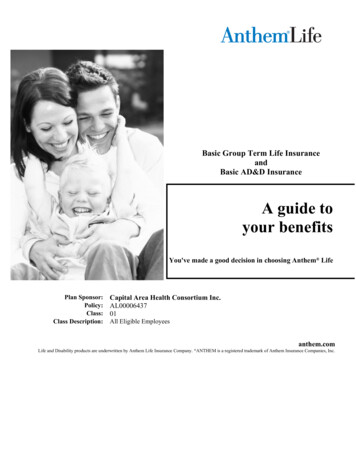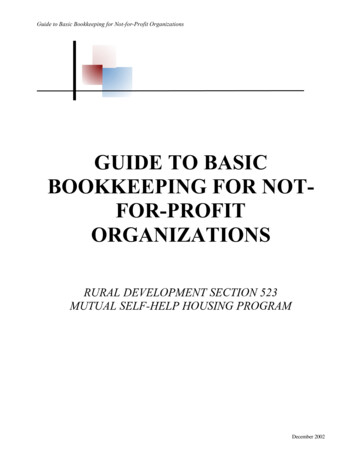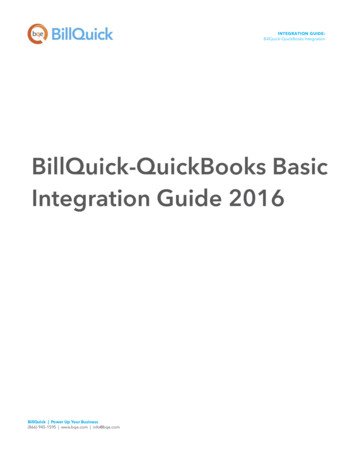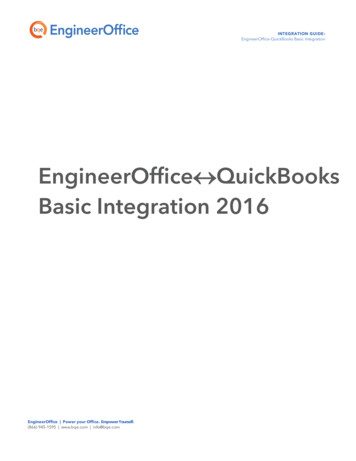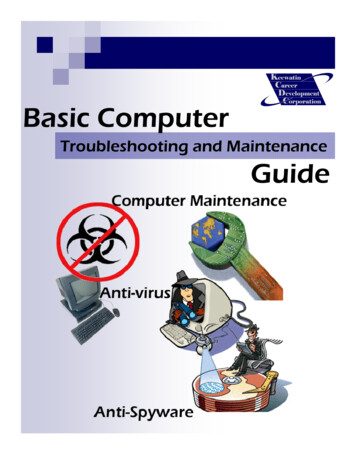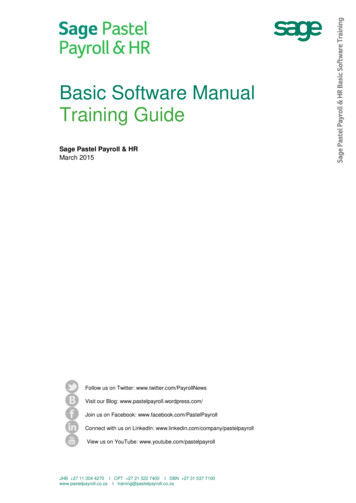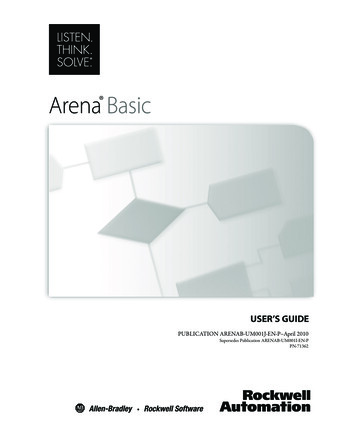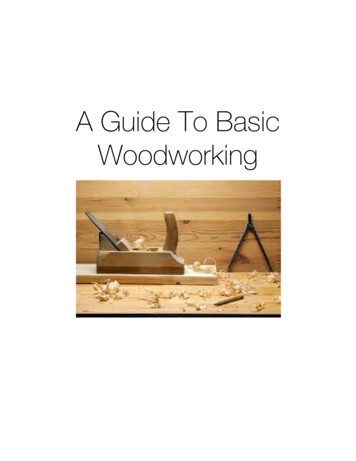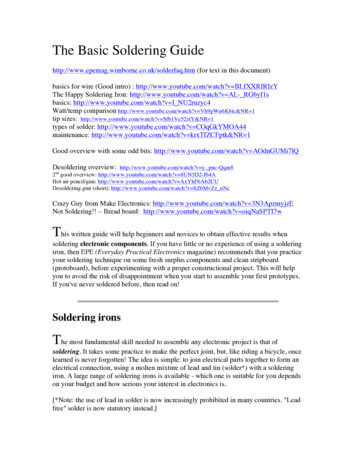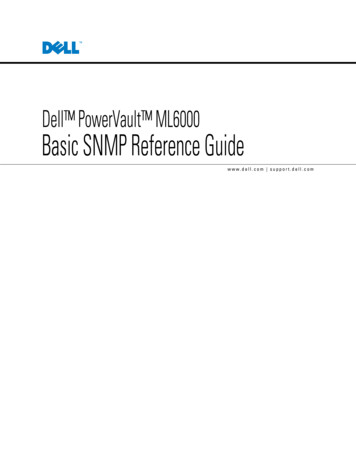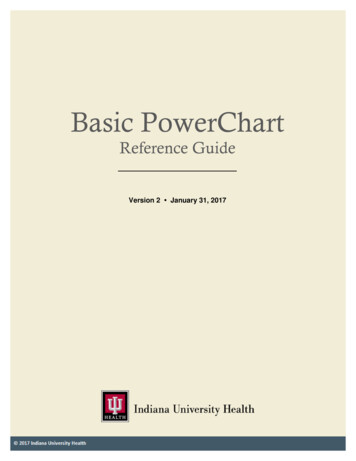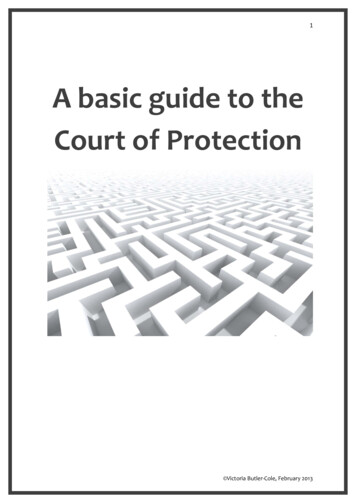
Transcription
1A basic guide to theCourt of Protection Victoria Butler-Cole, February 2013
2Table of contentsPageWho is this guide for?4What is the Court of Protection?4What can the Court of Protection do?5What is the law that applies to the Court ofProtection?5Do all decisions for people who lack capacityhave to be made by the Court?6What are section 21A cases?7How does the Court decide what to do?7How will my case be dealt with?8What will I have to do?9What should I call the judge?9What are the most important rules that I need toknow about?10What can I do if I disagree with the Court’sdecisions?11 Victoria Butler-Cole, February 2013
3What do I need to know about court forms anddocuments?11What do all the legal words mean?12What happens if P dies?19How can I get a lawyer to represent me inthe Court of Protection?20Where can I get more help and information?21 Victoria Butler-Cole, February 2013
4Who is this guide for?This guide gives you a basic explanation about the Court ofProtection in England and Wales. It is for people who are involvedin proceedings in the Court of Protection, or who want to find outif the Court of Protection can help them or someone they know.Most of the guide is about welfare cases. These are cases aboutwhere people should live, what care they should receive, and whothey should be able to spend time with. Some of the guide is alsorelevant to property and financial affairs cases. If you don’tunderstand some of the words in this guide, please look at thedefinitions which start on page 12.What is the Court of Protection?The Court of Protection is a court in England and Wales that canmake decisions on behalf of people who cannot make their owndecisions because they have something wrong with their brain, forexample dementia, autism, or a brain injury.The person who lacks capacity is known as “P” in the proceedings.The Court is not just in one place – a Court of Protection hearingcould be in the Royal Courts of Justice in London, or in a countycourt outside London. There are lots of different judges who arepart of the Court of Protection. Victoria Butler-Cole, February 2013
5What can the Court of Protection do?The Court of Protection can: Decide whether or not a person is able to make their owndecisions.This is called deciding whether someone has capacity to maketheir own decisions. A person who cannot make their owndecisions ‘lacks capacity’. Make a decision for someone who cannot make that decisionfor themselves.This is called making a best interests decision for someone wholacks capacity. Read the definition of ‘best interests’ on page13.The Court of Protection can NOT make a decision on behalf ofsomeone who has capacity to make that decision for himself.What is the law that applies to theCourt of Protection?The Court of Protection was set up by the Mental Capacity Act2005. The court applies the rules that are in that Act. The court isalso required to make decisions that respect people’s humanrights under the Human Rights Act 1998, including the right to afair hearing, and the right to respect for private and family life. Victoria Butler-Cole, February 2013
6These are other rules and guidance that apply to the court: The Mental Capacity Act Code of Practice The Mental Capacity Act Deprivation of Liberty SafeguardsCode of Practice The Court of Protection Rules Court of Protection Practice DirectionsDo all decisions for people who lackcapacity have to be made by theCourt?No. Usually, if someone lacks capacity to make their owndecisions, their family and carers will be able to make decisions forthat person, by deciding together what would be best.Sometimes, family members or carers may disagree with eachother, or with social workers, nurses or other professionals.Sometimes, families, carers and professionals will all agree whatshould happen, but the person themselves may disagree – forexample, an elderly person who does not want to move into a carehome, even though everyone else thinks this would be the bestway to keep them safe. If people cannot agree with each other,the Court should be asked to decide.The Court can make decisions about: welfare – for example where someone should live, what carethey should receive, and whether they should be allowed tosee their friends and relations. Victoria Butler-Cole, February 2013
7 property and financial affairs – for example, whethersomeone is a suitable person to hold a Lasting Power ofAttorney, or whether a statutory will should be written for P. whether or not serious medical treatment should be given tosomeone who lacks capacity.What are section 21A cases?Section 21A cases are cases where there is an urgent or standardauthorisation and someone has applied to the court because theydon’t think that P’s best interests are being met. Section 21A casesare similar to other Court of Protection cases, but are often moreurgent. Different rules apply about legal aid in these cases.How does the Court decide what todo?The court decides what to do by getting all the evidence it needs,and by speaking to the people who are involved. This means thatdocuments about P will need to be shared, for example socialservices records, or P’s bank statements.People who want the court to listen to their view will need to writewitness statements which say what they think should happen, andexplain their views.Sometimes, the judge will decide that she needs to ask anindependent expert to give extra advice. This could be advice Victoria Butler-Cole, February 2013
8about whether P lacks capacity to make his own decisions, oradvice about what the effect would be on P of the differentchoices that are available.How will my case be dealt with?The first step in most cases is for a judge to read the application,and give the person who has made the application permission toproceed.Then, the judge will need to decide who should be a party to theproceedings, whether P needs to have a litigation friend to helphim or her in the proceedings, and who should be the litigationfriend for P.Next, all the evidence will need to be gathered – medical records,social services records, witness statements and so on.Then, the judge may decide to have a fact-finding hearing, if thereare major disagreement about important things that happened inthe past which are still relevant to what is best for P now. Or, thejudge may decide to ask an independent expert for advice.There may be a lot of directions hearings while the court isgathering all the evidence it needs. Eventually, there will be a finalhearing when the court decides whether P lacks capacity, andwhat would be best for P. Victoria Butler-Cole, February 2013
9What will I have to do?You will need to read all the documents that are produced, so thatyou know what the evidence is.You should write a witness statement which explains your viewsand tells the judge everything you think she needs to know to helpher make a decision.In a hearing, you may need to speak to the judge to explain whatyou want her to do. And, you may have to cross-examine (or askquestions of) other witnesses. If this happens, the judge will helpyou ask appropriate questions.It is always helpful to try to write down the most importantquestions that you want to ask before you go into the hearing, sothat you don’t forget anything.You can take a friend with you into a hearing, who can help you bywriting down things that other people say, and reminding youabout the questions you wanted to ask. They may be able tospeak to the judge too, if the judge agrees. This person is knownas a McKenzie friend, and they must promise to keep everythingthey hear and read confidential.What should I call the judge?A District Judge is called Sir or Madam.A Circuit Judge is called Your Honour.A High Court Judge is called My Lord, or My Lady. Victoria Butler-Cole, February 2013
10What are the most important rulesthat I need to know about? CostsIn welfare cases, usually everyone pays their own costs of takingpart, including the costs of their lawyers. But, if you behaveunreasonably, for example by ignoring court orders, or wastingthe court’s time, you may be told that you have to pay otherpeople’s costs. These can be very large amounts of money – tensof thousands of pounds. If you are worried about this, you shouldask the judge what you need to do to avoid having to pay anyoneelse’s costs. ConfidentialityMost hearings and proceedings in the Court of Protection areconfidential and held in private. You must not tell MPs orjournalists, or even other friends and relations, about whathappens in court, and you must not show the court documentsand evidence to anyone else apart from a lawyer. If you want totalk about the proceedings to other people, or show documents toanyone else, you must ask the judge first. Victoria Butler-Cole, February 2013
11What can I do if I disagree with theCourt’s decisions?If you think that the court has made the wrong decision, you canask the judge who made the decision for permission to appealagainst her decision. If she says no, you can fill in an applicationform, within 21 days, to ask another judge for permission toappeal. Please see page 22 for the website address to downloadthe appeal forms.What do I need to know about courtforms and documents?All the court documents are available on the internet. Thedocuments about deputies and attorneys are on the Office of thePublic Guardian website. Website links to these forms and theCourt of Protection forms are at the end of this booklet.If you want to ask the Court to decide something, you willprobably need to fill in these forms: COP1, COP2, and COP3. Youwill also need to fill in COP1a if your case is about money orproperty. If your case is about welfare, you need to fill in COP1b.You should also fill in a COP24 form which contains your witnessstatement.If you want to use the section 21A procedure for challenging anurgent or standard authorisation under the deprivation of libertysafeguards, there are special forms, called COPDLA, COPDLB andCOPDLC. Victoria Butler-Cole, February 2013
12There are other special forms for applications to be made a Deputy(COP4) and applications that are about powers of attorney.There are guidance notes on the internet to go with each formwhich tell you which forms you need to fill in, and what you shouldput in them. Make sure you read these guidance notes before youfill in the forms.What do all the legal words mean?Here are some of the words and phrases you may come across inthe Court of Protection:AdjournAppealApplicationA hearing may have to be adjourned if theparties are not ready to have it. This is called anadjournment. If there is a hearing planned andyou need more time to prepare, or there issome other reason why you think the hearingshould be moved to a later date, you can applyfor an adjournment using a COP9 form.If you think that a judge has made the wrongdecision, you can ask the judge for permissionto appeal to a higher level of judge. You can askthe judge at the hearing where s/he makes thedecision, or you can ask for permission by fillingin a form no later than 21 days after the judge'sdecision.An application is when you ask the court to dosomething, for example to make a decision onP's behalf, or to adjourn a hearing. Victoria Butler-Cole, February 2013
13BarristerA barrister is an independent lawyer whospeaks to the judge in court.Best interestsIf someone lacks capacity to make a decision,that decision will have to be taken by someoneelse. When you make a decision for someonewho lacks capacity, you have to act in their bestinterests. This is not the same as deciding whatP would have wanted, but, it is very importantto find out what P’s wishes are. You also needto consider the views of people who care for P,for example P’s friends, family and carers. Youuse all of this information to help decide whatwould be the best thing to do for P.CapacityCapacity means having the ability to make yourown decisions. If you lack capacity, it meansthat you have something wrong with your mindor your brain which stops you from being ableto make decisions. This might be because youcannot understand what the choices are, orbecause your memory is very bad, or perhapsbecause you find it difficult to think about lotsof information at once.It is important to try to help people to havecapacity to make their own decisions, forexample by giving them simple and clearinformation, at a time when they are at theirbest.Circuit judgeA Circuit judge is the next level up from aDistrict JudgeConsent orderA consent order is an order that all the partiesagree with. If you can agree what should be Victoria Butler-Cole, February 2013
14written in a consent order, then you may notneed to have a hearing to ask the judge what todo.Contempt ofcourtIf you disobey a court order that tells you to dosomething, or not to do something, then youwill be in contempt of court. This means thatthe court could decide to make you pay a fine,or could send you to prison. If you see an orderwhich says ‘penal notice’ on it, you must makesure that you obey the order.DeclarationA declaration is made when the Court decidessomething. For example, the Court coulddeclare that P lacks capacity and that it is in P'sbest interests to live in a particular place.Deprivation oflibertyA deprivation of liberty is when someone iskept in a particular place against their wishes,or when they have a lot of restrictions on whatthey can do, where they can go, and who theycan see.DeputyA Deputy is a person who the court chooses tomake decisions on behalf of P.DirectionsDirections are orders that the judge makesabout what should happen in the proceedings,for example that a local authority should giveeveryone a copy of P's care plan, or that afamily member should write a witnessstatement.District judgeA District Judge is the lowest level of judge inthe Court of Protection. Victoria Butler-Cole, February 2013
15DraftDraft is the word that lawyers use to meanwrite - for example, a lawyer might say thatthey have drafted an order.EvidenceEvidence is the information that the judge isgiven to help her decide what to do. There canbe written evidence in witness statements, ororal evidence, when someone speaks to thejudge in court having promised to tell the truth.ExhibitAn exhibit is a piece of information that is partof the evidence, for example a letter, or a bankstatement. If you want the judge to see adocument, you can attach it to your witnessstatement and call it Exhibit A etc.ExpertAn expert is someone who knows a lot about aparticular topic, for example psychiatry, orsocial work. The judge may decide that sheneeds an independent expert to help figure outthe questions the judge has to answer about P.Fact-findingFact-finding is when the judge decides whetheror not things are true. For example, if the localauthority says that in the past, P's familyneglected P, then the judge will decide whetheror not this really happened. Usually, the judgewill listen to what everyone has to say, andthen decide who she believes.Final declarationA final declaration is the final decision by theCourt about the things that it has been asked todecide. Victoria Butler-Cole, February 2013
16Final hearingA final hearing is the last hearing in theproceedings, where the judge decides what isbest for P.HearingA hearing is when you go to court to speak tothe judge. Hearings can sometimes be bytelephone or even by video link.High Court JudgeA High Court Judge is the highest level of judgein the Court of Protection./ There are moresenior judges in the Court of Appeal and theSupreme Court.InterimdeclarationAn interim declaration is a declaration that theCourt makes before the proceedings havefinished. The judge might decide that sheneeds more information before she can decidewhether P lacks capacity to make his owndecisions, but she might make an interimdeclaration that it seems as though P may lackcapacity.IMCAAn IMCA is an independent mental capacityadvocate. An IMCA’s job is to talk to P and getto know him, and to tell people what P wantsto happen.Joint instructionA joint instruction is when two or more partiesask an expert to write a report to help thecourt decide whether P has capacity, or what isbest for P.JurisdictionJurisdiction means the powers of the court. Ifthe court has no jurisdiction, that means itcannot make any decisions. For example, the Victoria Butler-Cole, February 2013
17court has no jurisdiction to make decisions onbehalf of people who have capacity to decidefor themselves.Letter ofinstructionA letter of instruction is the letter that you sendto an expert, explaining what the case is aboutand what you want the expert to help you with.Liberty to applyLiberty to apply means that if the court makesan order without you having had a chance totell the judge what you think should happen,you can make an application to the judge to askher to change her mind. If you still disagreewith the judge’s decision even after you havetold her what you want, you can ask forpermission to appeal.Litigation friendA litigation friend is someone who takes P'splace in the proceedings, if P lacks capacity totake part in the proceedings himself. Forexample, the litigation friend could instructsolicitors on behalf of P, or the litigation friendcould speak to the judge directly on P's behalf.A litigation friend could be a family member, afriend, or the Official Solicitor.Official SolicitorThe Official Solicitor is a lawyer who is paid forby the government. He can be the litigationfriend for someone who lacks capacity tomanage the court proceedings for themselves,if there is no-one else who could do this. Hehas staff who work on different cases in theCourt of Protection. Victoria Butler-Cole, February 2013
18OrderAn order is the document that the courtproduces when the judge has made somedecisions or has told people what to do. It isvery important to obey court orders if theyapply to you.PP is the name given to the person theproceedings are about.PartiesParties to the proceedings are the people ororganisations who are involved in the case.Power of attorney A power of attorney is when someone who hascapacity decides in advance who they wouldlike to make decisions for them, if they laterlose capacity.RevokeRevoke means to cancel or change an earlierdecision.S21ASection 21A is the part of the Mental CapacityAct 2005 which allows you to challenge adeprivation of liberty authorisation in the court.SolicitorSolicitors are a type of lawyer.StandardauthorisationA standard authorisation is something that alocal authority can put in place when P isdeprived of his liberty in a care home or ahospital. If you think that P should not be inthe care home or the hospital, you can apply tothe court to stop the standard authorisationand to say that P should be allowed to livesomewhere else. Victoria Butler-Cole, February 2013
19SubmissionsSubmissions are when you explain to the judgewhat you want her to do, or what you think sheshould decide is best for PSubstantivehearingA substantive hearing is a hearing where thejudge will make decisions about importantthings, not just give directions.UrgentauthorisationAn urgent authorisation is something that acare home or hospital can put in place whenthey think that P is being deprived of his liberty.If you think that P should not be deprived of hisliberty, you can apply to the court to stop theurgent authorisation. Urgent authorisationsonly last for a week. Usually a standardauthorisation is put in place when the urgentauthorisation runs out.VacateVacate means to cancel a hearing.VaryVary means to change.WitnessstatementA witness statement is an important piece ofevidence for the judge, where someoneexplains what they think about the questionsthat the judge has to decide.Witnessstatements must have a statement of truth,where the person who has written thestatement signs to say that it is definitely true.What happens if P dies? Victoria Butler-Cole, February 2013
20The Court can only make decisions for P that P could have madehimself. If P dies during the proceedings, the Court cannot makeany decisions on behalf of P. The proceedings will finish. The onlythings the Court can still make decisions about are who should payfor the costs of the proceedings.When P dies, usually the parties will agree a consent order whichcan be sent to the judge, which will say that the proceedings havecome to an end because P has died, and will explain how the costsof the proceedings are going to be paid for.How can I get a lawyer to representme in the Court of Protection?You may be entitled to free legal representation in some cases, inparticular if there is an urgent or standard authorisation in place,or if you receive a qualifying benefit. You should speak to a lawyerto find out whether you are entitled to legal aid to help you pay fora solicitor or barrister.If you cannot get legal aid, but you cannot afford to pay for yourown lawyers, you could ask the Bar Pro Bono Unit whether theycan help you by finding a barrister who would work for free.If you have some funds but cannot afford a solicitor and a barristerfor all of the proceedings, you could look for a barrister who canbe directly instructed (called Direct Access or Public Access) torepresent you in a hearing. The Bar Council can tell you whichbarristers might be able to do this work for you. Victoria Butler-Cole, February 2013
21Where can I get more help andinformation?Here are some organisations that may be able to help you: The Citizens Advice Bureauwww.citizensadvice.org.uk Local or regional advocacy services, including IndependentMental Capacity Advocates or IMCAsAsk your local authority or Council for details The Free Representation Unitwww.thefru.org.uk The Bar Pro Bono Unitwww.barprobono.org.uk The Law Societywww.lawsociety.org.uk The Bar er/public-access/ The Personal Support Unit (for help during hearings)www.thepsu.orgHere are some websites that may be of use: The Mental Capacity Act Codes of Practice and bookletsabout the Acto /mental-capacity-act Victoria Butler-Cole, February 2013
22 The Court of Protection formso http://www.mentalhealthlaw.co.uk/Court of Protectionforms The Office of the Public Guardian formso http://www.justice.gov.uk/forms/opg Court of Protection caselawo www.bailii.orgo www.mentalhealthlaw.co.uko www.copcasesonline.co.ukIf you can’t find the answer to a question that you have about theCourt of Protection in this booklet, please emailcourtguides@gmail.com – that way the answer to your questionmay be included in the next version of the booklet. Victoria Butler-Cole, February 2013
This guide gives you a basic explanation about the Court of Protection in England and Wales. It is for people who are involved in proceedings in the Court of Protection, or who want to find out if the Court of Protection can help themor someone they know. Most of the gui
